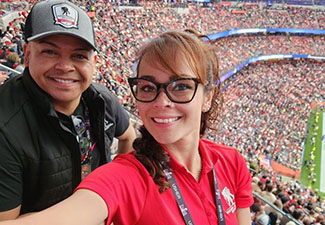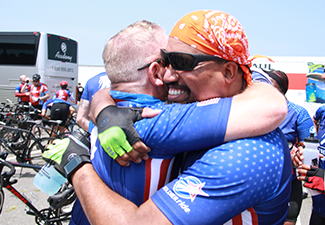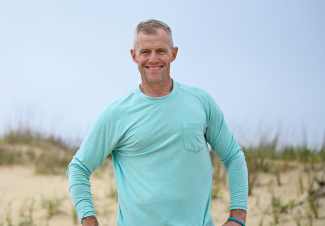From Ground Zero to New Heights: Antoinette Wallace’s Journey with Wounded Warrior Project

Like many teenagers, Antoinette Wallace hadn’t solidified her future career plans. Though she dreamt of becoming a lawyer, the military was not on her radar.
But on Sept. 11, 2001, the 16-year-old’s world, like many others, turned upside down.
“Where I was going to school in Staten Island, we had the perfect view of the World Trade Center,” Antoinette recalled. “To see it in real-time, then see smoke for weeks, and smell it … I felt like I wanted to do something, to have a sense of purpose.”
Despite being unfamiliar with the military, Antoinette decided to join the Army. When she told her parents, they dismissed it as an emotional reaction and advised Antoinette to focus on school.
Permission to Join, Sir
Upon high school graduation in 2002, Antoinette presented herself to the local Army recruitment office. There was only one problem: Antoinette was still 17 and not old enough to enlist without parental consent.
“I was ready to serve, but I needed a permission slip from my parents,” she said, laughing at the memory.
Antoinette became one of the more than 181,500 Americans who enlisted into active-duty service in the year following the 9/11 attacks. Spurred by her passion for legal justice, she enlisted as a paralegal specialist.
Just after her 18th birthday, Antoinette reported to Army basic training at Fort Leonard Wood, Missouri. Looking back, she admits, “I was pretty naïve; I didn’t know the magnitude of my decision then.”

Opportunities and Choices
After spending a year in the Army National Guard, Antoinette’s unit was called to active duty, and in 2005, she was deployed to Iraq. Recognizing her skills, she was selected to become a division court reporter and began learning all about the Uniform Code of Military Justice (UMCJ). However, after handling some extremely tough cases, including one that involved the death of a company commander, Antoinette realized she needed to make a change.
“I realized I didn’t have the stomach to do law, but I still wanted to be of service to people,” she said. “I had worked at a pharmacy in high school, so I was like, you know, I’m going to become a pharmacist.”
Over the next few years, Antoinette dove into her new assignment, feeling optimistic about her decision. “The military really needed pharmacists, so it was a good choice. And I was able to block out all the bad stuff that had happened in Iraq because I was so busy.”
The Silent War for Mental Health

In February 2011, after nearly nine years of service, Antoinette left the Army. However, the transition to civilian life proved more challenging than she predicted.
“Mentally, I felt defeated, without a sense of purpose again. I was finishing pharmacy school to earn my doctorate and was under a great deal of stress at the time,” Antoinette shared. The stress acted as a catalyst, bringing forth memories of trauma that occurred in Iraq.
The battle for her mental well-being began.
“I knew I was not well, that something was wrong, but I didn’t know how to verbalize it,” said Antoinette, who was diagnosed with depression, anxiety, and post-traumatic stress disorder (PTSD).
“Back then, mental health was still taboo. PTSD was looked at like a death sentence if people knew you had it. That was such a barrier to getting help, so I didn’t have the support I needed. I was hanging on by a prayer, trying to get by day by day,” she confessed.

Nighttime was the most challenging. “My bed became a warzone. I feared going to bed because I had excruciating nightmares and was reliving things.”
She didn’t have many friends who understood the silent battles she fought within herself, including feelings of doubt and self-worth that all seemed to stem from that one incident in Iraq.
Over time, suicidal thoughts became the norm. “I don’t know how it didn’t happen,” Antoinette said.
Finally, one day, summoning all the courage she had, Antoinette told her parents about what she had experienced while deployed – and that she wanted to end her life.
“At first, it was a huge weight off my shoulders, but then it felt like a burden because I could see the pain in their faces,” she said, adding that she began sleeping in between her parents so they could watch over her.
This revelation, however, led to Antoinette spending several months as an inpatient at a VA women’s trauma unit. It was here that she learned about Wounded Warrior Project® (WWP).
Watch: Veterans Reflect on Service after 9/11
A Sanctuary for Healing
Initially, Antoinette didn’t think she could be a part of an organization like WWP™. “I wasn’t visibly wounded. I wasn’t missing a limb. I had both my arms and legs,” she said.
It's a common misconception that veterans must have sustained a physical injury to take part in WWP's free programs and services. Although the veteran's organization first began providing backpacks filled with comfort items to wounded soldiers in the hospital, WWP has evolved to offer various programs and services related to mental and brain health, career counseling, connection, and long-term rehabilitative care.

At the urging of others, Antoinette agreed to register but was hesitant to attend events.
“You say to yourself, ‘I don’t know anybody; these are all strangers.’ But then one day, you take the plunge,” said Antoinette, who signed up for a kayaking trip despite not having any experience.
Quickly, WWP became a sanctuary, a place where Antoinette could share her struggles and triumphs with those who truly understood. "You realize that these people are like you. They all have trauma and flaws, just like I have my flaws and trauma, even if they aren’t physical. They get you.”
Through shared experiences with other WWP Alumni, Antoinette began to rebuild herself.
Riding to Recovery
In 2016, Antoinette signed up to participate in one of WWP’s signature events – Soldier Ride®, a multi-day adaptive cycling event. But fear started to creep back in.
“I had many personal challenges that I was facing, which almost led me to back out at the last minute. When I contacted a Soldier Ride coordinator to voice my concerns, he insisted I attend. I feel very fortunate that he did because it was a pivotal point in my life", Antoinette said.
“This event was like the cornerstone of my recovery and involvement with the Wounded Warrior Project. I met some women warriors I feel should have been in my life from the beginning. Even though they're from the other side of the country, we became really good friends and formed a lasting bond,” she said, adding that the women still get together in person annually.

“Wounded Warrior Project was the missing link I needed. Before, I felt empty. I would isolate myself and not want to do anything. Connecting with people, especially other women, who could relate to me and accepted me as I was, filled a void I’d had in my life for years. I felt whole again,” she said.
Antoinette, who purposefully took a break from work to focus on healing, realized she still wanted to live a life of service and be a leader. In May 2023, she graduated from Rutgers Business School with an MBA. Today, she is the pharmacist-in-charge at an independent specialty pharmacy in New York.
She credits WWP for helping her reach these achievements.
“When I got involved with Wounded Warrior Project, I didn’t think I’d return to work. But Wounded Warrior Project was a stepping stone for me to regain my confidence. [They] told me I am enough. That I can inspire and make positive changes.”
A Platform for Change
A pivotal moment in Antoinette’s journey came in 2017 when she met former WWP CEO Lt. Gen. (Ret.) Mike Linnington and mentioned that WWP should increase its programming for women warriors.
Soon after, Antoinette joined the organization’s National Campaign Team, a volunteer group of military veterans and caregivers who share their experiences to help raise awareness of WWP and its mission.
“At first, I was hesitant because I wasn’t sure if I had the courage to speak openly about the events that led me to the Wounded Warrior Project in the first place,” she said.
After a few emails from other team members, Antoinette reconsidered, realizing that by sharing her story, she could offer hope to others and contribute to a collective narrative to raise awareness of the unique challenges female service members face.

“My mindset changed from a place of shame about things that happened in my life to empowerment,” she said. ”Speaking gave me a platform to not only recover by getting my story out there, but it was an opportunity to meet other veterans and become more actively involved with a cause to help bring about needed change. It gave me that sense of purpose again that I had been missing for a long time.”
Antoinette’s journey is a testament to the transformative powers of purpose and community. Her story is a powerful reminder of the importance of asking for help and the strength that comes when you find an understanding and supportive community.
“It’s great to wake up every day with a sense of purpose, looking forward to the future as opposed to dreading it,” said Antoinette. “Wounded Warrior Project helped me to find happiness and truly enjoy my life again.”
Contact: Cynthia Weiss – Public Relations, cweiss@woundedwarriorproject.org, 904. 738.2589
About Wounded Warrior Project
Since 2003, Wounded Warrior Project® (WWP) has been meeting the growing needs of warriors, their families, and caregivers — helping them achieve their highest ambition. Learn more about Wounded Warrior Project.


